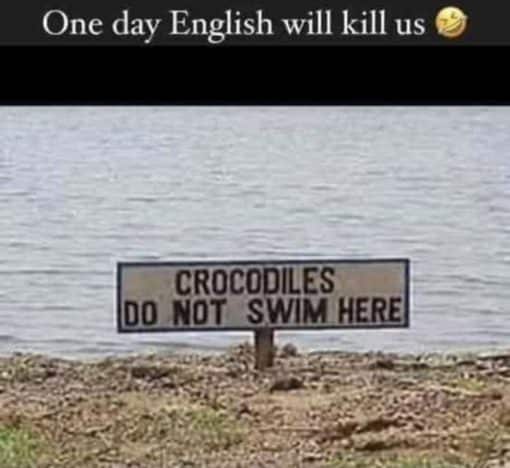CROCODILES DO NOT SWIM HERE
The image shows a sign positioned near a body of water, presumably a lake or river, with the text "CROCODILES DO NOT SWIM HERE" in bold, capital letters. The sign's message is quite literal and unambiguous. The scene appears calm with no visible crocodiles or people, and the water surface seems tranquil. The sign is planted into the ground with a basic structure, consisting of two vertical posts supporting a horizontal board where the message is displayed.
Above the photograph is a caption in a contrasting font that reads, "One day English will kill us" accompanied by a laughing emoji. This caption suggests that there is some humor to be found in the language used on the sign, and the emoji signifies that the situation or the misuse of language is meant to be taken lightly, in jest.
The humor perceived in this image is likely due to the interpretation of the sign's message. It seems to bluntly state that crocodiles do not swim in that particular area, which may come across as an odd proclamation. Usually, warning signs near bodies of water that are common habitats for dangerous creatures like crocodiles would alert people to the potential danger with a message such as "Beware of crocodiles" or "Crocodile-infested waters."
What makes this sign particularly amusing is the unintended implication that crocodiles might abide by the sign's direction—as if they could read the sign and decide not to swim there. This absurd idea that crocodiles could read and follow human rules taps into a common comedic trope: animals or inanimate objects behaving like humans or participating in human society.
Another layer of the humor comes from the playful mockery of English signage, which sometimes might not convey the intended warning effectively due to odd phrasing or seemingly contradicting the common sense understanding of the situation: crocodiles are not known to heed signs made by humans.
Lastly, the caption implies a broader notion that the English language can sometimes be confusing or even 'dangerous' in its potential to mislead. The caption exaggerates this concern to a comedic degree, suggesting that such literal yet illogical interpretations of English could result in humorous, albeit life-threatening, misunderstandings. Hence, the overall joke is a light-hearted commentary on language misunderstandings and the quirks of English signage. CROCODILES DO NOT SWIM HERE
